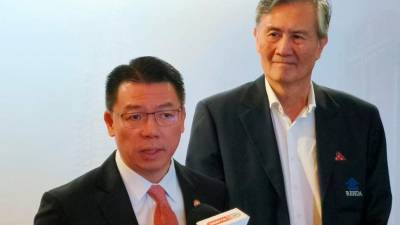PETALING JAYA: The government is strategising to integrate Transit-Oriented Development into future public housing to improve access for urban communities to job opportunities and education, and also help to ease traffic congestion in city centres.
Housing and Local Government Minister Nga Kor Ming said Malaysia is also expanding the adoption of Industrialised Building System and modular technologies such as prefabricated prefinished volumetric construction in public housing projects, adding that this approach reduces construction costs, minimises noise pollution and lowers construction waste.
“In addition, Malaysia through public-private-people partnerships is strengthening green building standards, updating codes and incentivising sustainable practices across urban development projects.
“Our Malaysian GreenRE and Green Building Index are among the testaments to this effort, fostering innovation and responsible development.
“From energy-efficient design standards to promoting renewable energy adoption such as solar, geothermal, and beyond, our strategic focus centres on transforming Malaysia into a model of sustainable urban living,” he told delegates at the International Green Build Conference 2025 today.
Nga said Malaysia and Asean are undergoing rapid urbanisation, with the rate projected to rise from 56% today to 70% by 2050.
Capitals such as Kuala Lumpur, Jakarta and Bangkok are already grappling with the growing pressures of urban growth, including severe traffic congestion and the rising challenge of housing affordability for local communities.
Nga pointed out that the World Bank has cautioned that if left unchecked, urban sprawl could cost Asean economies as much as 2% of gross domestic product annually by 2030 due to congestion and pollution.
“These realities demand urgent, innovative, and comprehensive action. We cannot afford to treat sustainability as an afterthought or optional; it must be the very foundation upon which we design, develop, and build our future cities and communities,” he said.
Moving on, Nga said Malaysia has pledged to develop 1,000 Madani recreational parks nationwide by 2035, aiming to expand green spaces.
“Notably, for the first time in our history, we have successfully transformed a safely decommissioned landfill in Bandar Tenggara, Johor, into a public park, a milestone that not only helps to mitigate environmental pollution and eliminate odor issues but also provides the community with much-needed green spaces for recreation, leisure, and social activities.
“In Penang, we secured US$10 million (RM42.2 million) from the Global Climate Adaptation Fund to incorporate stormwater management systems into public parks and to install green roofs on the Hin Bus Depot.
“Building on this success, Malaysia is now actively seeking an additional US$20 million from the fund to scale up climate-resilient, nature-based solutions in Kuala Lumpur,” Nga said.
In line with the National Energy Transition Roadmap to achieve 70% of renewable energy capacity by 2050, Nga said. the ministry is aiming to set up 18 waste-to-energy plants across Peninsular Malaysia.
These facilities are expected to generate up to 600MW of clean energy, thereby reducing reliance on landfills and lowering greenhouse gas emissions.
“Furthermore, we have set a target of 40% recycling rate, which calls for a whole-of-nation approach starting at the community level,” Nga said.
Meanwhile, GreenRE chairman Datuk FD Iskandar said the Green Relief has certified over 400 million square feet of cross-floor area across more than 800 projects, encompassing residential, commercial, industrial, and institutional developments.
Green Relief, commonly referred to as GreenRE, is a Malaysian green certification tool designed to uphold and promote sustainable building practices within the country’s real estate sector.
Iskandar said this achievement reflects more than just a numerical achievement and signals that the market is prepared to embrace sustainable practices.
“Sustainability has moved beyond being merely aspirational; it is now fully operational. This momentum extends beyond Malaysia, with Green Relief also certifying projects in the United Kingdom, Australia, Vietnam, Cambodia and Thailand.”
Iskandar said this demonstrates that Malaysia is not only capable of exporting materials but also exporting talent and technical leadership.
“Green Relief is practical, performance-based, and effective because it is designed specifically for our climate, our economy, and our buildings. This approach aligns closely with Malaysia’s policy direction, from the upcoming Urban Renewal Act to the Energy Efficiency and Conservation Act and the Climate Change Act. Green Relief is not just a compliance tool; it is a readiness tool.”
